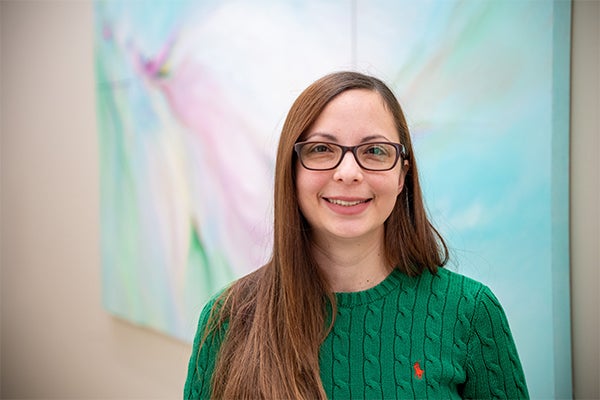Leveraging Telenovelas for Health Education
Nursing research leverages video dramas to prevent STI transmission
When she was completing her nursing doctoral education at the University of Miami, Dr. Madeline Fernandez got thrown for a loop – she was enlisted to help produce a Spanish-language soap opera series to teach Hispanic women how to protect themselves from the very real surge in HIV infections in Hispanic communities.
The soap opera, called a telenovela in Spanish, is a four-part series available to study participants to gauge how the telenovela functions to educate and inform Hispanic women about HIV prevention methods and practices.
“Each episode is 10 minutes, very short, and this was intentional to capture the attention of the audience online. We had actors and a director, and they put together these four episodes of HIV prevention together with women from the community and the researchers including different topics like condom use and alcohol use,” Fernandez said.

Actors from a soap opera produced in part by ECU assistant professor of nursing Dr. Madeline Fernandez discuss sexual health as part of the show’s storyline. (Contributed photo)

An actor from a soap opera produced in part by ECU assistant professor of nursing Dr. Madeline Fernandez discusses sexual health as part of the show’s storyline (Contributed photo)
One of the key social and cultural forces in Hispanic cultures that Fernandez and her team tried to address is machismo and marianismo, gender-based social norms that dictate often unspoken behavioral practices. Machismo invites men to be brash, physically dominating and possessive of their female partners while marianismo dictates traditional roles for women: subordination, humility, purity and responsibility for home life.
“The series title, “Infeccion de amor” (“Infectious Love”) reflects how intimate partner relationships can increase the risk of HIV among Latinas; more than 90% of cases among women are due to heterosexual contact,” said Dr. Natalia Villegas Rodriguez, the study’s primary investigator and an associate professor of nursing at UNC-Chapel Hill.
The Centers for Disease Control and Prevention report that Hispanics are disproportionately affected by new HIV diagnoses, and the U.S. Department of Health and Human Services, recently said Hispanic women have more than three times as many HIV infections and are three times as likely to die from an HIV infection as their white counterparts.
Making the episodes authentic and relatable to Latina viewers was crucial, Fernandez said.
“We did focus groups with women. They told us what they wanted to see from the actors, how they wanted them to look, what they wanted them to wear. They wanted it to be more realistic settings,” Fernandez said.
Equally important for Fernandez’ team was having the product available for women to watch on computers and mobile devices. The research team’s concern was allowing their study participants to watch the videos discretely, allowing women in the audience to consume the suggested HIV prevention practices in the videos without having to explain to partners why they were viewing the telenovela.
“There’s a lot of stigma around HIV [in Hispanic communities] so a woman could say, ‘I’m watching a soap opera,’ which is quite common in the Hispanic population,” Fernandez said. “Their male parts will not be too interested in what she’s watching, just another soap opera, and she’s getting educated on how to protect herself.”

Dr. Madeline Fernandez, an ECU assistant professor of nursing, participated in research that resulted in a soap opera series that educates Hispanic women about sexual health. (Photo by Ty Huff)
The actors in the videos and the director were bilingual Latinos and had prior experiences working with the Spanish-speaking community of South Florida. The producer was part of the University of Miami’s music department, and the production team relied on feedback from test audiences to make sure the vocabulary used in the script could be understood across Hispanic cultural groups.
“We have found very high stigma anytime we do surveys. Nobody wants to be tied to this kind of research, even if it’s ‘I’m just going there for information.’ These women can’t even mention the word condom around their husband because it’s automatically ‘Oh, you’re cheating on me,’” Fernandez said.
While the telenovela project she worked on in Miami likely wouldn’t translate seamlessly to North Carolina viewers, Fernandez agrees that significant work needs to be done in rural North Carolina to bring HIV infection rates down. One advantage was that this soap opera was co-created with Latina women in an area of Florida with a higher number of Latino immigrants from Mexico and Central America, which is similar to the demographics of the Latino population in NC.
HIV infection rates in North Carolina are drastically imbalanced in terms of race, according to a 2021 report from the North Carolina Department of Health and Human Services. Black women have nearly 10 times the infection rate as white women, and Hispanic women are at least three times as likely to be infected as their white peers.
Fernandez’ ongoing research centers on grief following miscarriage, but she is excited about Villegas Rodriguez’ teaching students to support mothers having trouble with breastfeeding after giving birth, as well as teaching them best telehealth practices for supporting new mothers with lactation challenges.
Fernandez hopes to use the successes of the University of Miami project as a blueprint for similar dramatic videos that can help counsel women about grief in the immediate aftermath of miscarriage or infant death.
